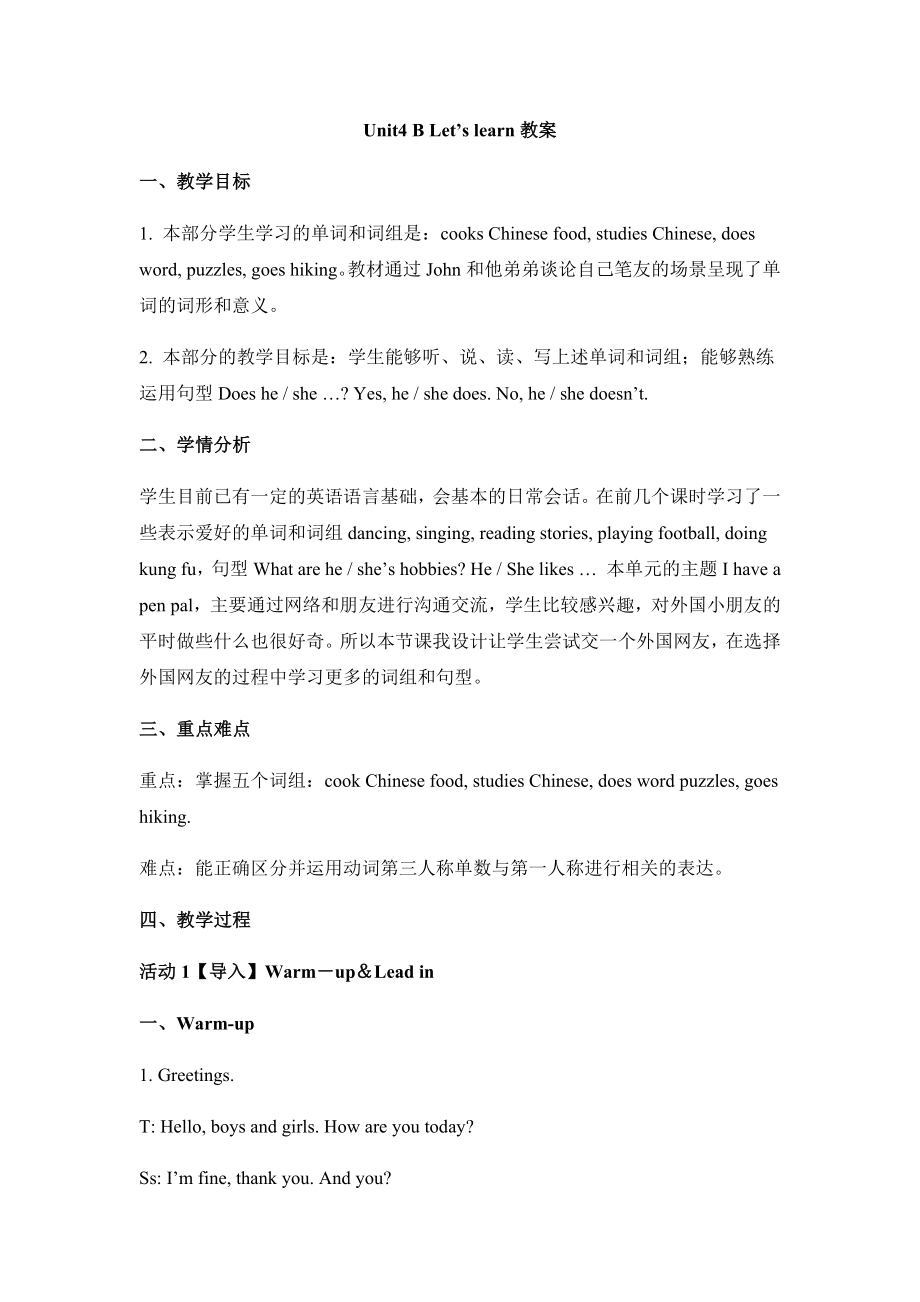《六年級上冊英語教案-Unit 4 I have a pen pal PB Let’s learn人教PEP版》由會員分享��,可在線閱讀�����,更多相關(guān)《六年級上冊英語教案-Unit 4 I have a pen pal PB Let’s learn人教PEP版(6頁珍藏版)》請?jiān)谘b配圖網(wǎng)上搜索���。
1�、Unit4 B Let’s learn教案
一��、教學(xué)目標(biāo)
1. 本部分學(xué)生學(xué)習(xí)的單詞和詞組是:cooks Chinese food, studies Chinese, does word, puzzles, goes hiking���。教材通過John和他弟弟談?wù)撟约汗P友的場景呈現(xiàn)了單詞的詞形和意義�。
2. 本部分的教學(xué)目標(biāo)是:學(xué)生能夠聽�����、說、讀���、寫上述單詞和詞組��;能夠熟練運(yùn)用句型Does he / she …? Yes, he / she does. No, he / she doesn’t.
二、學(xué)情分析
學(xué)生目前已有一定的英語語言基礎(chǔ)��,會基本的日常會話����。在前幾個課時學(xué)習(xí)了一些表示愛
2����、好的單詞和詞組dancing, singing, reading stories, playing football, doing kung fu���,句型What are he / she’s hobbies? He / She likes … 本單元的主題I have a pen pal���,主要通過網(wǎng)絡(luò)和朋友進(jìn)行溝通交流�,學(xué)生比較感興趣,對外國小朋友的平時做些什么也很好奇�����。所以本節(jié)課我設(shè)計(jì)讓學(xué)生嘗試交一個外國網(wǎng)友���,在選擇外國網(wǎng)友的過程中學(xué)習(xí)更多的詞組和句型�。
三、重點(diǎn)難點(diǎn)
重點(diǎn):掌握五個詞組:cook Chinese food, studies Chinese, does word puzz
3�、les, goes hiking.
難點(diǎn):能正確區(qū)分并運(yùn)用動詞第三人稱單數(shù)與第一人稱進(jìn)行相關(guān)的表達(dá)���。
四、教學(xué)過程
活動1【導(dǎo)入】Warm-up&Lead in
一��、Warm-up
1. Greetings.
T: Hello, boys and girls. How are you today?
Ss: I’m fine, thank you. And you?
T: Very well, thanks.
2. Free talk.
T: Great weather, isn’t it? I want to fly a kite this weekend. What do
4��、 you often do on the weekends?
Ss: I often …
T: I often surf the Internet. I often chat with my QQ friends. Do you have QQ friends? How many QQ friends do you have? Where are they from? Do you have foreign friends?
Ss: ...
T: I have! Do you want to have one …? Today, I’ll help you! I’m going to
5����、introduce some of my foreign QQ friends to you. If you have the same hobbies with them, you can be QQ friends each other. I hope everyone can make a foreign friend today.
設(shè)計(jì)意圖:通過課余生活的討論��,引出本節(jié)課的主線—QQ聊天�。激發(fā)學(xué)生想結(jié)交外國好友的興趣。
3. And today, I want to make more QQ friends, too. Look! This is my QQ friend list
6、. Do you want to be my QQ friends? … So, come on boys and girls!
二���、Lead in.
1. 教師的QQ消息聲音響起���。
T: Oh, I have a message. It’s from John. He is a foreigner. Where does he live? Can you guess?
Ss: Does he live in …?
教師指向John的頭像���,上面出現(xiàn)他的一些基本信息。引導(dǎo)學(xué)生說出:He lives in Australia.
2. 教師點(diǎn)擊John的頭像�����,出現(xiàn)對話框��。
John:
7��、Hi, Melody! I have put many pictures in my Qzone. Come and have a look!
T: Let’s visit John’s Qzone together!
設(shè)計(jì)意圖:用瀏覽教師好友的QQ空間的方式���,直觀了解外國青少年的課余生活。為之后第三人稱單數(shù)的學(xué)習(xí)做準(zhǔn)備��。
活動2【講授】Presentation
三、Presentation and practice
打開John的空間�����,里面有很多他的信息����,還有他上傳的圖片���。教師使用課件展示John的空間照片��。
1. Choose the correct answer.
(1)
8�����、 He lives in _____.
China / Australia
(2) He likes _____ very much.
Canada / China
2. 在看一遍John的照片�,回答What does he often do?
Ss: He often cooks Chinese food, does word puzzles, goes hiking and studies Chinese. (老師板書重點(diǎn)詞組,強(qiáng)調(diào)第三稱單數(shù)的變化)
課件出現(xiàn)這四張圖片并聽錄音跟讀�����。
設(shè)計(jì)意圖:在師生共同描述John時,通過課件的提示,讓學(xué)生自己感受單三的變化��,并在真實(shí)自然
9���、的語境下輕松完成第三人稱單數(shù)的學(xué)習(xí)��。
2. 學(xué)生結(jié)伴完成討論:Talk about John. 教師組織學(xué)生運(yùn)用單數(shù)第三人稱介紹他人經(jīng)常做的事情��。
He ... He often ...
3. Summary.
總結(jié)本課所學(xué)的第三人稱單數(shù)詞組����,并在課件上用不同顏色把第三人稱單數(shù)動詞變形進(jìn)行歸類。
This is John.
He _______ China, he _____ China very much. He often ____________, _______________, _______________ and _______________.
4. Liste
10����、n, match and say.
(1) T: John is my best QQ friend. I have many other QQ friends, let’s have a look… They are Oliver, Miss Green, John and Mr. Jones.
在教師的QQ中呈現(xiàn)這部分四個人物的照片。請學(xué)生看圖和對話示例��,預(yù)測對話內(nèi)容��。請學(xué)生根據(jù)圖片說出動詞詞組,做好聽力準(zhǔn)備。
T: What do they often do? Can you guess?
引導(dǎo)學(xué)生用Does Oliver often …?來猜他們經(jīng)常做的事情�。
設(shè)計(jì)意圖:用猜
11���、人物經(jīng)常做什么的方式復(fù)習(xí)上節(jié)課所學(xué)句型Does he / she …? 并鞏固本節(jié)課的重點(diǎn)詞組�。
(2) 聽錄音,連線��。
Listen, match and say. 聽力文本:
①Woman: Oliver likes word puzzles. He does them every day.
②Man: Miss Green studies Chinese. She writes Chinese characters every week.
③Woman: John is tall and strong. He goes hiking every Saturday.
④Man:
12、 Mr. Jones lives in China and he often teaches his son to cook Chinese food.
(3) Brainstorm.
給學(xué)生五秒鐘記住這四個人經(jīng)常做的事情���,然后去連線����,學(xué)生憑記憶回答老師的問題:Does Oliver / Miss Green / John / often…?
4. Let’s wrap it up.
此時,QQ消息聲音又響起����。
T: I have another message. It’s from my friend Jane. What does she say?
教師點(diǎn)擊Jane的頭像�����,出現(xiàn)
13��、對話框��。Jane發(fā)來一張圖片���。這時課件中出現(xiàn)Let’s wrap it up內(nèi)容�。
(1) 閱讀短文����,判斷正誤。(true or false)
①Jane has a cat! (T)
②The cat loves to play games. (F)
③Jane studies English every afternoon. (F)
④Jane teaches her sister to draw every week. (F)
(2) 趣讀短文�����。讀到動詞就拍手!
設(shè)計(jì)意圖:此部分融入Let’s wrap it up. 用趣讀短文的形式讓學(xué)生感知動詞及其變化����,既總結(jié)了本節(jié)課
14、的重點(diǎn)���,又為家庭作業(yè)奠定理解基礎(chǔ)��。
(3) 把動詞劃上線并填空��。
教師將這些動詞做成詞卡貼在黑板上��,請學(xué)生先同桌討論可以分成幾組�,完成書本的填空練習(xí)����。然后請兩名學(xué)生上來分組����,并陳述理由 (詞尾變化有怎樣的特點(diǎn))。全班核對答案��,教師布置學(xué)生快速閱讀Extension中的語篇�����,從文中找出更多同類的詞補(bǔ)充進(jìn)來���。
設(shè)計(jì)意圖:通過發(fā)現(xiàn)式學(xué)習(xí)��,學(xué)生觀察總結(jié)第三人稱單數(shù)詞尾變化規(guī)律�����,并通過說、讀���、寫的形式強(qiáng)化學(xué)生對規(guī)律的運(yùn)用。
活動3【練習(xí)】Extension
四�、Extension
1. 教師提供更多的外國朋友信息以供學(xué)生選擇��。
Lily:
Lily is 12. She lives i
15�����、n New York. She often swims and goes hiking. She likes singing. She also likes Chinese songs. Her QQ number is: 1033235436.
Jack:
Jack is 13. He is from Canada. He likes Chinese kung fu very much. He often flies kites on weekends. He wants to learn Chinese. Can you teach him? His QQ number is: 89
16、78643849.
Miss Black:
This is Miss Black. She lives in Beijing. She is an English teacher. She often watches TV and rides a bike after school. She cooks Chinese food every week. Her QQ number is 583039049. Her e-mail is: amyblack123@.
T: Do you want to be their QQ friends? … Why? (老師先給學(xué)生示范I want to choose Miss black. Because she often … I often … too.)
設(shè)計(jì)意圖:提供更多的好友信息,供學(xué)生根據(jù)他們的興趣愛好來選擇朋友�。
2. Find out more verbs.
找出以上補(bǔ)充信息里面的動詞,并把這些詞貼在黑板上并進(jìn)行歸類�。
活動4【作業(yè)】Homework
五�����、Homework
Visit the website: . You can make more friends.
設(shè)計(jì)意圖:學(xué)生實(shí)踐如何通過網(wǎng)絡(luò)結(jié)交更多的朋友��。
 六年級上冊英語教案-Unit 4 I have a pen pal PB Let’s learn人教PEP版
六年級上冊英語教案-Unit 4 I have a pen pal PB Let’s learn人教PEP版

